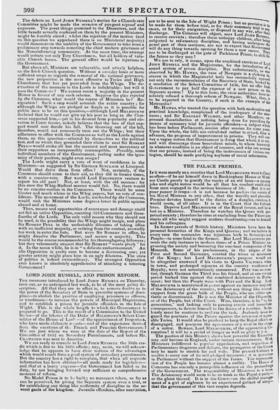LORD JOHN RUSSELL, AND PRISON REFORM.
THE measures introduced by Lord Jowl RUSSELL on Thursday, turn out, as we anticipated last week, to be of the most paltry de- scription. All that they are to effect is, to remove doubts us to the power of the Secretary of State to prescribe systems of disci- pline—to abolish the practice of employing prisoners as officers, or wardsmen—to increase the powers of Municipal Magistrates, and to establish a prison for juvenile offenders in the Isle of Wight. This is the whole length to which the Government is prepared to go. This is the result of a Commission to the United States—of the labours of the Duke of Ricumoun's Select Com- mittee of the House of LW, —of the appointment of Inspectot s, who have made elaborate rt norts—and of the experience desist d from the exertions of tie, French and Prussian Governments 1 We are just where we were at the date of the Report of the Committee of 1832 on Secondary Punishments, and before Mr. CRAWFORD was sent to America.
We are ready to concede to Lord JOHN RUSSELL the little cre- dit which is due to his little efforts; nay, more we will acknow- ledge that he appears to have clear notions of the advantages which would result from a good system of secondary punishments. Bnt the country has a right to complain, that when all requisite information has been obtained—all made ready for legislation— and that at a heavy expense—the Government has failed in its duty, by not bringing forward any sufficient or comprehensive measure of reform.
No Model Prison is to be built ; no measures taken, so far as can be perceived, for giving the Separate system even a trial, or for establishing any thing like uniformity of discipline in the se- veral gaols of the kingdom. Juvenile offenders, after conviction,
are to be sent to the Isle of Wight Prison ; but no provision is 10 be made for them before trial, or for their summary trial in arw cases, or for their emigration, or disposal in any way, after th discharge. The Colonies will object, says Lord JOHN RUSSEI,e4 to receive convicts ; therefore these unhappy children, after heiel,' subjected to reformatory discipline, and having undergone the penal part of their sentence, are not to expect that Govereineet will do any thing towards opening for them a new career. They are to be discharged at the gate of Parkhurst Prison, to shift for the future as they may ! We are to rely, it seems, upon the combined exertions of Lord JOHN RUSSELL and the Magistrates, for the introduction of sound system of prison discipline. But unfortunately, as wu observed by Mr. HAWES, the case of Newgate is a striking ia. stance in which the Magisterial body has successfully opposed not only the recommendation of the Secretary of State, backed by a resolution of the Select Committee of 1836, but an offer from Government to pay half the expense of a new prison on the Separate system ! Up to this hour, the civic authorities have re. solutely refused a thorough reform of Newgate. What, then, o to be expected in the Country, if such is the example of the Metropolis?
Mr. HAWKS, who treated the question with both moderation and practical knowledge, complained of the inadequacy of the noel. sures ; and Sir EARDLEY WILMOT, and other Members, es. pressed dissatisfaction at nothing being done for providing the means of summary trial for juvenile offenders—a subject which has been before Parliament, session after session for some years Upon the whole, the bills are calculated rather to retard, than to advance, the progress of improvement in prisons. They will eon- vey a vague notion that Government is doing that which It is not; and will discourage those benevolent minds, to whom humanity in whatever condition is an object of concern, and who are anxious that our prisons, instead of being the instruments of vicious con- tagion, should be made purifying asylums of moral reformation.


























 Previous page
Previous page